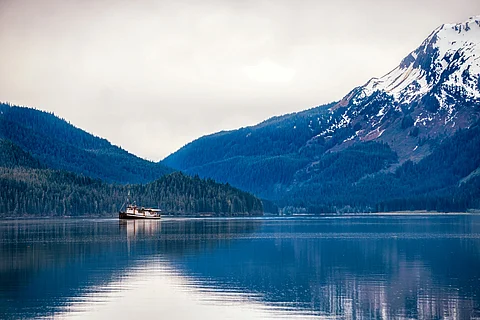

"This milestone reflects the dedication of our fishers, processors, and management partners who continue to uphold these essential practices, reaffirming Alaska's commitment to responsible salmon fishing," said Kristy Clement, CEO of the Alaska Fisheries Development Foundation.
Photo: Adobe Stock.
Although expected since the end of October, it was only this week, after overcoming objections raised by several conservation organizations, that the Marine Stewardship Council (MSC) confirmed the Alaska wild salmon fishery has achieved its recertification against the MSC Fisheries Standard.
Including five species of Pacific salmon - Coho-silver salmon, Chinook salmon, Sockeye-red salmon, Pink salmon, and Chum salmon -, the MSC-certified Alaska salmon fishery covers seven gear types in 14 different geographic areas.
MSC fishery certificates are valid for five years, so this one - managed by the Alaska Fisheries Development Foundation (AFDF) - is valid until 2028. However, it will undergo annual audits by an external assessor to ensure that it continues to meet the MSC standard.
Principles of the MSC Fisheries Standard include maintaining healthy fish populations, preserving the marine ecosystem, and ensuring the fishery is properly managed and follows international treaties, federal laws, and state regulations.
Thus, the Marine Stewardship Council recalled in its release that the MSC certification process requires rigorous science-based assessments and regular audits by an external assessor to ensure that certified fisheries meet its strict criteria for sustainable fishing practices.
As one of the originals to join the program, the Alaska salmon fishery is a pioneer of high standards for sustainable fishing and environmental stewardship. Alaska salmon was the third fishery in the world, and the first U.S. fishery, to achieve MSC certification in September 2000.
As its fifth certification, this means that the Alaska wild salmon fishery has been committed to the Marine Stewardship Council's program and its mission to end overfishing and ensure seafood is fished sustainably for 25 years, a quarter of a century.
"The Alaska salmon fishery has been a true leader in the sustainable seafood movement with 25 years of engagement with the MSC," highlighted Nicole Condon, US program director at the Marine Stewardship Council. "This milestone is a testament not only to their leadership but also to the tireless efforts of everyone involved in the fishery to protect our ocean and fishery resources," she added, congratulating them on what she called a landmark achievement.
Kristy Clement, CEO of the Alaska Fisheries Development Foundation, spoke along the same lines. "Achieving our fifth MSC certification is more than just an accomplishment—it's a testament to the Alaska salmon fishery's legacy of sustainability and stewardship," she said.
"For a quarter century, the Alaska salmon fishery has exemplified the MSC's rigorous standard for sustainable fishing, rooted in practices that trace back to Alaska's Indigenous traditions, where sustainability and stewardship are a way of life," she continued. "This milestone reflects the dedication of our fishers, processors, and management partners who continue to uphold these essential practices, reaffirming Alaska's commitment to responsible salmon fishing."
Dan Averill, Senior Fisheries Manager at the Marine Stewardship Council, insisted on the same argument. "Alaska Salmon's fifth certification deserves the highest recognition. 25 years in the MSC program is a powerful validation of long-term dedication to sustainable fishing," he said. "I commend the Alaska Department of Fish and Game for their statewide management of salmon, as well as all the fishermen and the processors who help to feed the world."
In the release communicating the recertification, the MSC noted that sustainable resource management is reflected in Alaska's commitment to preserving the state's natural resources, and that its approach to fisheries management seeks to ensure that fishing practices remain sustainable and that vital resources, such as wild salmon, continue to thrive in healthy ecosystems.
With this fifth certification, the Alaska salmon fishery continues to maintain the highest standards in sustainable fishing, making MSC-certified sustainable seafood available globally. And that is precisely the value of MSC certification, it provides external validation of the sustainable practices of Alaska's fishery, offering consumers around the world a trusted mark of assurance of Alaska's commitment to sustainable fishing.
